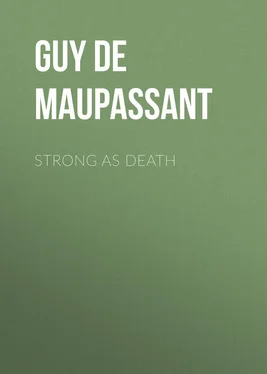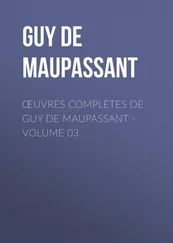Guy Maupassant - Strong as Death
Здесь есть возможность читать онлайн «Guy Maupassant - Strong as Death» — ознакомительный отрывок электронной книги совершенно бесплатно, а после прочтения отрывка купить полную версию. В некоторых случаях можно слушать аудио, скачать через торрент в формате fb2 и присутствует краткое содержание. Жанр: literature_19, foreign_antique, foreign_prose, на английском языке. Описание произведения, (предисловие) а так же отзывы посетителей доступны на портале библиотеки ЛибКат.
- Название:Strong as Death
- Автор:
- Жанр:
- Год:неизвестен
- ISBN:нет данных
- Рейтинг книги:4 / 5. Голосов: 1
-
Избранное:Добавить в избранное
- Отзывы:
-
Ваша оценка:
- 80
- 1
- 2
- 3
- 4
- 5
Strong as Death: краткое содержание, описание и аннотация
Предлагаем к чтению аннотацию, описание, краткое содержание или предисловие (зависит от того, что написал сам автор книги «Strong as Death»). Если вы не нашли необходимую информацию о книге — напишите в комментариях, мы постараемся отыскать её.
Strong as Death — читать онлайн ознакомительный отрывок
Ниже представлен текст книги, разбитый по страницам. Система сохранения места последней прочитанной страницы, позволяет с удобством читать онлайн бесплатно книгу «Strong as Death», без необходимости каждый раз заново искать на чём Вы остановились. Поставьте закладку, и сможете в любой момент перейти на страницу, на которой закончили чтение.
Интервал:
Закладка:
“Oh, if I knew how to draw I would show you my thought: it should be very new, very bold. They are taking him down from the cross, and the man who has detached the hands has let drop the whole upper part of the body. It has fallen upon the crowd below, and they lift up their arms to receive and sustain it. Do you understand?”
Yes, he understood; he even thought the conception quite original; but he held himself as belonging to the modern style, and as his fair friend reclined upon the divan, with one daintily-shod foot peeping out, giving to the eye the sensation of flesh gleaming through the almost transparent stocking, he said: “Ah, that is what I should paint! That is life – a woman’s foot at the edge of her skirt! Into that subject one may put everything – truth, desire, poetry. Nothing is more graceful or more charming than a woman’s foot; and what mystery it suggests: the hidden limb, lost yet imagined beneath its veiling folds of drapery!”
Sitting on the floor, a la Turque , he seized her shoe and drew it off, and the foot, coming out of its leather sheath, moved about quickly, like a little animal surprised at being set free.
“Isn’t that elegant, distinguished, and material – more material than the hand? Show me your hand, Any!”
She wore long gloves reaching to the elbow. In order to remove one she took it by the upper edge and slipped it down quickly, turning it inside out, as one would skin a snake. The arm appeared, white, plump, round, so suddenly bared as to produce an idea of complete and bold nudity.
She gave him her hand, which drooped from her wrist. The rings sparkled on her white fingers, and the narrow pink nails seemed like amorous claws protruding at the tips of that little feminine paw.
Olivier Bertin handled it tenderly and admiringly. He played with the fingers as if they were live toys, while saying:
“What a strange thing! What a strange thing! What a pretty little member, intelligent and adroit, which executes whatever one wills – books, laces, houses, pyramids, locomotives, pastry, or caresses, which last is its pleasantest function.”
He drew off the rings one by one, and as the wedding-ring fell in its turn, he murmured smilingly:
“The law! Let us salute it!”
“Nonsense!” said the Countess, slightly wounded.
Bertin had always been inclined to satirical banter, that tendency of the French to mingle irony with the most serious sentiments, and he had often unintentionally made her sad, without knowing how to understand the subtle distinctions of women, or to discern the border of sacred ground, as he himself said. Above all things it vexed her whenever he alluded with a touch of familiar lightness to their attachment, which was an affair of such long standing that he declared it the most beautiful example of love in the nineteenth century. After a silence, she inquired:
“Will you take Annette and me to the varnishing-day reception?”
“Certainly.”
Then she asked him about the best pictures to be shown in the next exposition, which was to open in a fortnight.
Suddenly, however, she appeared to recollect something she had forgotten.
“Come, give me my shoe,” she said. “I am going now.”
He was playing dreamily with the light shoe, turning it over abstractedly in his hands. He leaned over, kissed the foot, which appeared to float between the skirt and the rug, and which, a little chilled by the air, no longer moved restlessly about; then he slipped on the shoe, and Madame de Guilleroy, rising, approached the table, on which were scattered papers, open letters, old and recent, beside a painter’s inkstand, in which the ink had dried. She looked at it all with curiosity, touched the papers, and lifted them to look underneath.
Bertin approached her, saying:
“You will disarrange my disorder.”
Without replying to this, she inquired:
“Who is the gentleman that wishes to buy your Baigneuses ?”
“An American whom I do not know.”
“Have you come to an agreement about the Chanteuse des rues ?”
“Yes. Ten thousand.”
“You did well. It was pretty, but not exceptional. Good-by, dear.”
She presented her cheek, which he brushed with a calm kiss; then she disappeared through the portieres, saying in an undertone:
“Friday – eight o’clock. I do not wish you to go with me to the door – you know that very well. Good-by!”
When she had gone he first lighted another cigarette, then he began to pace slowly to and fro in his studio. All the past of this liaison unrolled itself before him. He recalled all its details, now long remote, sought them and put them together, interested in this solitary pursuit of reminiscences.
It was at the moment when he had just risen like a star on the horizon of artistic Paris, when the painters were monopolizing the favor of the public, and had built up a quarter with magnificent dwellings, earned by a few strokes of the brush.
After his return from Rome, in 1864, he had lived for some years without success or renown; then suddenly, in 1868, he exhibited his Cleopatra , and in a few days was being praised to the skies by both critics and public.
In 1872, after the war, and after the death of Henri Regnault had made for all his brethren, a sort of pedestal of glory, a Jocaste a bold subject, classed Bertin among the daring, although his wisely original execution made him acceptable even to the Academicians. In 1873 his first medal placed him beyond competition with his Juive d’Alger , which he exhibited on his return from a trip to Africa, and a portrait of the Princesse de Salia, in 1874, made him considered by the fashionable world the first portrait painter of his day. From that time he became the favorite painter of Parisian women of that class, the most skilful and ingenious interpreter of their grace, their bearing, and their nature. In a few months all the distinguished women in Paris solicited the favor of being reproduced by his brush. He was hard to please, and made them pay well for that favor.
After he had become the rage, and was received everywhere as a man of the world he saw one day, at the Duchesse de Mortemain’s house, a young woman in deep mourning, who was just leaving as he entered, and who, in this chance meeting in a doorway, dazzled him with a charming vision of grace and elegance.
On inquiring her name, he learned that she was the Comtesse de Guilleroy, wife of a Normandy country squire, agriculturist and deputy; that she was in mourning for her husband’s father; and that she was very intellectual, greatly admired, and much sought after.
Struck by the apparition that had delighted his artist’s eye, he said:
“Ah, there is some one whose portrait I should paint willingly!”
This remark was repeated to the young Countess the next day; and that evening Bertin received a little blue-tinted note, delicately perfumed, in a small, regular handwriting, slanting a little from left to right, which said:
“MONSIEUR:
“The Duchesse de Mortemain, who has just left my house, has assured me that you would be disposed to make, from my poor face, one of your masterpieces. I would entrust it to you willingly if I were certain that you did not speak idly, and that you really see in me something that you could reproduce and idealize.
“Accept, Monsieur, my sincere regards.
“ANNE DE GUILLEROY.”
He answered this note, asking when he might present himself at the Countess’s house, and was very simply invited to breakfast on the following Monday.
It was on the first floor of a large and luxurious modern house in the Boulevard Malesherbes. Traversing a large salon with blue silk walls, framed in white and gold, the painter was shown into a sort of boudoir hung with tapestries of the last century, light and coquettish, those tapestries a la Watteau , with their dainty coloring and graceful figures, which seem to have been designed and executed by workmen dreaming of love.
Читать дальшеИнтервал:
Закладка:
Похожие книги на «Strong as Death»
Представляем Вашему вниманию похожие книги на «Strong as Death» списком для выбора. Мы отобрали схожую по названию и смыслу литературу в надежде предоставить читателям больше вариантов отыскать новые, интересные, ещё непрочитанные произведения.
Обсуждение, отзывы о книге «Strong as Death» и просто собственные мнения читателей. Оставьте ваши комментарии, напишите, что Вы думаете о произведении, его смысле или главных героях. Укажите что конкретно понравилось, а что нет, и почему Вы так считаете.












